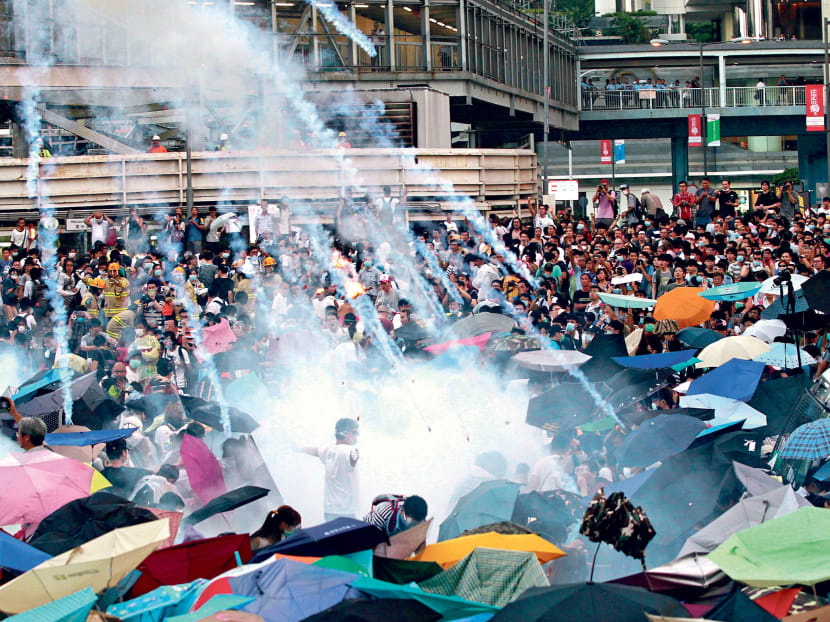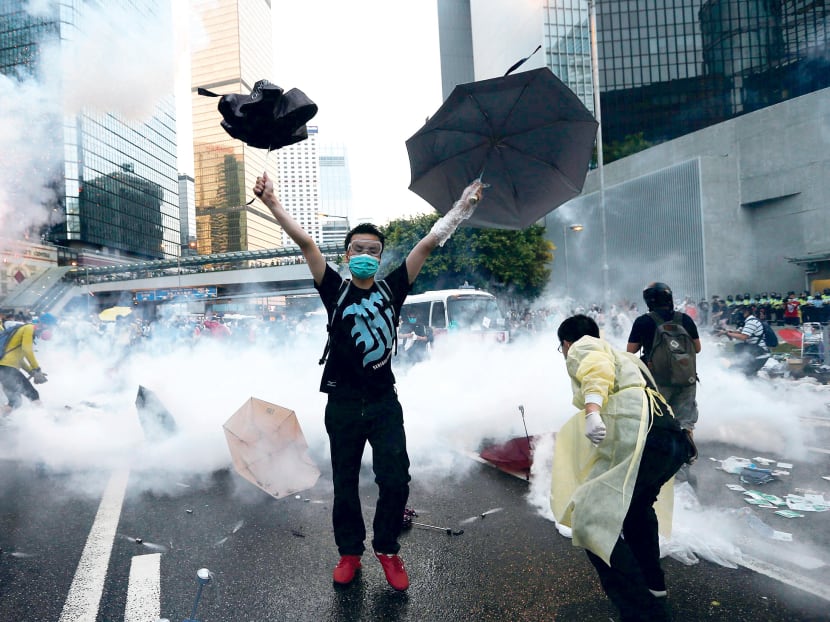Police fire tear gas at pro-democracy protesters in HK
HONG KONG — Clashes between pro-democracy protesters and the authorities in Hong Kong escalated yesterday when the police unleashed tear gas in an attempt to disperse the crowds that had besieged the city’s government for three days, while Beijing issued a firm condemnation of what it called “illegal acts” by the opposition.


HONG KONG — Clashes between pro-democracy protesters and the authorities in Hong Kong escalated yesterday when the police unleashed tear gas in an attempt to disperse the crowds that had besieged the city’s government for three days, while Beijing issued a firm condemnation of what it called “illegal acts” by the opposition.
The police fired tear-gas canisters at a crowd of thousands in front of the headquarters of the city government and, as the vapour spread, demonstrators retreated. They then sought to return to the area, which they seized on Friday night. Officers also squirted pepper spray and raised their batons to ward off angry residents.
Yet even hours after the police sought to break up the protest, the streets nearby remained crowded with thousands of defiant residents. Streets of the city known as a safe enclave for commerce became a night-time battleground.
Earlier yesterday, a large crowd trying to enter the protest area overwhelmed a police cordon, bringing traffic to a standstill on a six-lane highway.
Mr Steve Lee, 23, a recent university graduate who joined the protest, sobbed on the pavement after exposure to tear gas. “I don’t understand how the government can, in less than 30 seconds after a warning, use tear gas against peaceful student protesters,” he said. “Hong Kong has gone crazy. It is no longer the Hong Kong that I or the world know.”
The Hong Kong government said the police had warned the angry residents to “leave peacefully and in an orderly manner, otherwise officers would use a higher level of force”.
By using stronger tactics than they had, the local authorities risked provoking residents of a city that had seemed divided on the wisdom of mass protests against new election rules that would allow Beijing to screen candidates for the city’s top post. But the Chinese government endorsed the tough approach and publicly denounced the protests.
“We have full confidence and firmly support the special administrative region government in handling this according to the law, maintaining social stability in Hong Kong and protecting the safety of the lives and property of Hong Kong residents,” said a spokesman for the government’s Hong Kong Affairs Office, the official Xinhua news agency reported.
Hong Kong’s top official, Chief Executive Leung Chun-ying, told a news conference the protesters had used illegal means to threaten the government and expressed “absolute trust in the professional judgment of the police”.
The Hong Kong Federation of Students, one of the groups that organised the sit-in, urged students to boycott classes for a second week.
The protesters, many of whom wore makeshift masks and goggles, have focused their anger at a plan introduced by Beijing last month for electoral changes that, for the first time, would let the public vote for the city’s Chief Executive, beginning in 2017. But critics said a committee dominated by people loyal to the Chinese government would be able to screen out candidates who do not have Beijing’s backing, thus making a mockery of the election.
The most prominent group fighting the election proposal in Hong Kong has been Occupy Central with Love and Peace, which had planned to launch civil disobedience protests in Central, the city’s financial district, on Wednesday, a national holiday there.
But the group abruptly changed course on Saturday, acknowledging that the students’ actions had overtaken its plans and declaring that the sit-in in front of the city government would be the base of its protests. Co-founder of Occupy Central, Associate Professor Benny Tai of the University of Hong Kong, said he and other protesters were prepared to stay and peacefully resist any effort to clear the area.
Hong Kong, a former British colony, returned to China in 1997, agreeing to a policy of one country, two systems, which allowed it to keep civil liberties that are unseen on the mainland, while promising that the city’s leader would eventually be chosen through universal suffrage.
Commenting on the protests, Taiwanese President Ma Ying-jeou said he was worried about the developments in Hong Kong. “Taiwan is the only place in China where we are able to practise democracy,” Al Jazeera quoted him as saying yesterday. “We are very concerned about how it will affect Hong Kong’s future as well as China’s international image ... Any political turbulence will have significant implications on (Hong Kong’s) economic development.”
China and Taiwan have been historical foes since defeated Nationalists fled to the island after losing a civil war to China’s Communists in 1949. The government in Beijing regards Taiwan as a renegade province. AGENCIES





